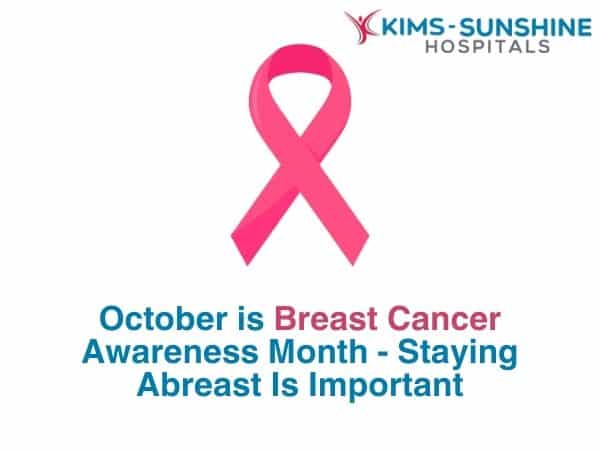
October is Breast Cancer Awareness Month – Staying Abreast Is Important

Did you know why a pink ribbon is commonly used to depict breast cancer? Because pink as a colour has mostly been associated with being feminine. There are many stories about why the pink coloured ribbon was chosen. But the goal was all the same- to show everyone that breast cancer was not getting the attention it deserved. A positive diagnosis can drastically change a life and how a person views themselves. This is why it is super important to learn all the early warning signs, how to perform self assessments and get the right treatment at the right time.
Theme For This Year
October 2024 is rightly called Breast Cancer Awareness Month or Pink Ribbon Month for so many reasons. The theme for this year is ‘No One Should Face Breast Cancer Alone’. A very common misconception is that women alone get affected, but no. Men do too, though the numbers are far lesser.
Why Celebrate Breast Cancer Awareness Month?
More than 28% of Indian women suffer from breast cancer of some form. Most of these women get diagnosed in much later stages. This means delayed diagnoses, delayed treatment and burgeoning costs with every session. Another worrisome trend noticed in India is that breast cancer affects women below 50 years of age. Many women tend to survive treatment but afterwards? The 5-year survival rate figures are pretty dismal.
Why Celebrating Breast Cancer Awareness Month Matters
There are a few choice reasons as to why taking part in this annual campaign is important:
- It is obviously designed to raise awareness among the populace that cancer detection needs to be done early.
- Women and men- both need to be made aware of the various risk factors involved, that can make them susceptible to cancer.
- Large organisations take part in major fundraising activities after partnering with hospitals and similar patient based groups.
- It also gives people a chance to talk about their experiences with different types of cancers like men having breast cancer, metastatic or inflammatory breast cancer etc.
- This can also be used to teach people that they need to go in for annual screening after the age of 40.
Conclusion
Cancer is a condition that is dependent on a variety of factors and genes do play the most important role, among others. If you have a cancer causing mutation in your familial genes, it makes more sense to be prepared as it is almost always going to strike you- at some point of time now or in the future. But what if there are no issues? Then you should be aware of cancer causing agents or factors- like living a sedentary lifestyle, using birth control, drinking or smoking excessively, exposure to radiation or mutagenic material etc. So, let us stay vigilant, get screened regularly and hope for the best!
Frequently Asked Questions
1. What symptoms should I watch out for?
It is time you learn to examine yourself closely – by touching and looking for any bumps or irregularities in your breast. Nothing to be shy about it at all. Watch out for these symptoms- any change in size or in the skin of the nipple, any lump, change in colour of the breast, pain or abnormal discharge.
2. Is breast cancer preventable?
Yes, definitely. Almost 30% of breast cancer cases have been said to occur due to poor lifestyle choices or exposure to mutagens. So, keeping track of any possible exposures and leading a generally active life will all work in your favour.
3. Are there different kinds of breast cancers?
Yes, breast cancer is an umbrella term used to describe a variety of cancers like metastatic, inflammatory, hereditary cancers and even male breast cancers respectively.
4. How can we all help in this initiative?
We can all help by learning how to self-examine first and then seeking help immediately to help improve our prognosis in the long run.
5. What are the various objectives of this annual campaign?
The WHO has come up with a list of priorities it wants to work on – it is mainly to encourage everyone to work together to put an end to breast cancer in the simplest of terms. This is done by the Global Breast Cancer Initiative which will help people seek the right kind of help at the right time and not worry incessantly about costs and other disparity-causing factors.






